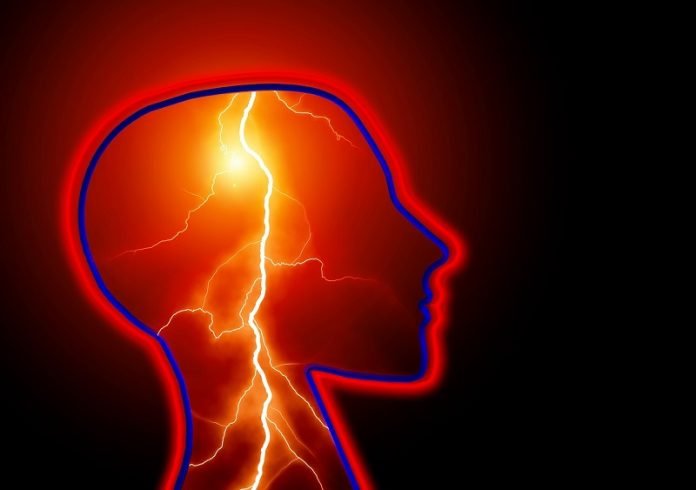
A new study from Aarhus University Hospital in Denmark found stroke survivors may have a higher risk of developing depression or another mood disorder within the first year compared to the general public as well as people who survived a heart attack.
The study is published in Stroke and was conducted by Nils Skajaa et al.
Past research shows depression is common after stroke, affecting nearly one-third of survivors.
In the study, the team focused on 86,111 people in Danish hospitals from 2004 to 2018 with no history of mental health disorders who had a stroke.
They found that stroke survivors had a 15% risk of developing a mood disorder, primarily depression, within the first year.
This risk corresponded to an approximately 2.3-fold increased risk compared with matched individuals from the Danish general population.
Stroke survivors also had an increased risk for other mental health problems, including substance abuse disorders and stress and anxiety disorders, as well as brain disorders such as dementia. But these conditions were less common.
The study also showed stroke survivors’ chances of developing depression are nearly 70% higher than people who survive a heart attack.
The findings provide more insight into the mental health complications following a stroke, which may be, at least in part, related to biological changes in the brain.
Future research needs to uncover the biological and psychosocial factors that might contribute to post-stroke depression.
A recent study showed that heart disease patients are also more likely to have depression, and there are good treatments for that.
For example, in a study from RCSI University of Medicine, researchers found that exercise is probably the most effective short-term treatment for depression in people with coronary heart disease when compared to antidepressants and psychotherapy or more complex care.
In the study, the team reviewed treatment research that examined antidepressants, psychotherapy, exercise, combined psychotherapy and antidepressants, and collaborative care.
The strongest treatment effects were found to be exercise and combination treatments (antidepressants and psychotherapy).
However, as the combination study results have a high risk of bias, the findings of the review suggest that exercise is probably the most effective treatment.
Antidepressants had the most research support, while psychotherapy and collaborative care did not perform very well.
The team says depression is common in patients with coronary artery disease. Having both conditions can have a significant impact on the quality of life for patients so it is vital that they access the most effective treatments.
This study indicates that exercise is likely to be the best treatment for depression following coronary artery disease.
The team says people with coronary heart disease who have symptoms of depression should talk to their doctor about treatments that are most suitable for their personal needs, and clinicians can be confident of recommending exercise to their patients.
The study is published in Psychosomatic Medicine.
Another study from Texas A&M University found that the antidepression drug duloxetine could be beneficial to patients with both depression and heart disease.
Globally, more than 300 million people have depression, which comes with an increased risk of developing heart disease.
When a blood vessel is injured, the platelets in our blood respond by forming clots that stop blood bleeding.
If this activation goes into overdrive, it can lead to thrombosis, a condition where blood clots form inside blood vessels and can dislodge to lead to a heart attack or stroke.
In the study, researchers showed that duloxetine inhibited platelet function and protected against clot formation.
The finding suggests that duloxetine, which has already been approved by the FDA for depression, has antithrombotic activity.
The researchers focused on duloxetine because it is a serotonin-norepinephrine reuptake inhibitor, which means it acts on the protein that controls levels of the neurotransmitter serotonin.
In addition to playing a role in depression, serotonin is known to help control platelet activity.
Using human blood, the researchers performed a series of experiments to examine duloxetine’s effects on platelets in human blood.
They found that the antidepressant inhibited platelet aggregation in a dose-dependent manner, implying that the drug could prevent clot formation.
Using a mouse model of thrombosis, the researchers also found that duloxetine slowed down the time it took for platelets to aggregate into a clot large enough to block an artery.
The team says understanding the antiplatelet effects of duloxetine is critical due to the prevalence of patients with depression and heart disease.
Having one drug that can treat both conditions could help avoid drug interactions. Duloxetine may also serve as a blueprint for developing a novel class of antithrombotic agents.
If you care about stroke, please read studies about doing this after stroke is critical for long-term survival, and this cholesterol in the body can predict stroke, heart attack effectively.
For more information about stroke and your health, please see recent studies about ‘angry and depressed,’ stroke survivor finds solace in helping others, and results showing that how could it be a stroke, mom asked – ‘she’s only 8’.
Copyright © 2022 Knowridge Science Report. All rights reserved.



